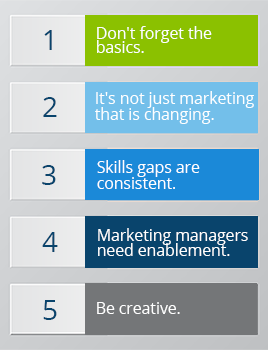What Companies Really Think About Their Marketing Skills Gaps
- B2B organizations can come together in shared experiences of marketing competency development and marketing enablement
- While it’s important to train marketers to use new tools, it’s vital that they understand foundational marketing skills
- Keep in mind that marketing managers need enablement, too
I received an early gift this past holiday season when I traveled to London to visit several of our marketing operations clients. In addition to meeting many great people, getting some culture, and having some excellent curry, I was able to facilitate a lively discussion on one of my favorite topics. Our client Equinix graciously hosted a roundtable event where members from ten B2B organizations shared their thoughts, observations, and experiences on the subject of marketing competency development in EMEA. Over the course of four hours, the group discussion covered three key topical areas of marketing skills gaps, competency mapping and marketing enablement program development.
Here are some takeaways from the spirited roundtable conversation:
 Don’t forget the basics. The roundtable participants agreed that it’s easy to be distracted by shiny new digital toys and delivery mechanisms. But regardless of available technology, good marketing still comes down to effective segmentation, targeted messaging, and relevant content and offers that speak to buyer and customer needs. While it’s important to train marketers to use new tools and tactics, it’s vital that they understand foundational marketing skills and target personas.
Don’t forget the basics. The roundtable participants agreed that it’s easy to be distracted by shiny new digital toys and delivery mechanisms. But regardless of available technology, good marketing still comes down to effective segmentation, targeted messaging, and relevant content and offers that speak to buyer and customer needs. While it’s important to train marketers to use new tools and tactics, it’s vital that they understand foundational marketing skills and target personas.- It’s not just marketing that is changing. Transformation was a running theme throughout the conversation. Participants noted that other company departments (e.g. sales, finance, IT) are also adapting to changing business models and the increased pace of execution. The transformation of marketing is not happening in a vacuum, and cannot be accomplished in isolation. There is a need to educate other company functions on the charter and priorities of modern marketing organizations. Otherwise, disconnects will persist among marketing and sales (“Do more events and give us more leads”), finance (“Budgets are going to be flat quarter over quarter, regardless of new programs being launched”) and IT (“Sorry, we can’t prioritize your new technology requests”).
- Skills gaps are consistent. There was strong consensus on marketing organizations’ most urgent skills gaps. These included strategic thinking and planning, analytics, and the ability to derive and act on business insights gleaned from analysis. The group agreed that, in order for marketing organizations to mature, these skills need to be developed in-house. Agencies can’t fill the gap, although they can execute on specific pieces.
- Marketing managers need enablement, too. If your organization is investing in competency development and marketing enablement programs, marketing managers are critical stakeholders. Arm front-line managers with the content, tools and diagnostic questions they need to have effective career and development conversations with their teams. The goal is to turn them into advocates for ongoing professional development.
- Be creative. The group agreed that getting executive support and investment for marketing enablement programs is not always easy – nor is it set in stone. When leadership changes hands or budgets get cut, support for marketing professional development tends to evaporate. Organizations that successfully maintain their focus on marketing enablement have adopted creative approaches – e.g. leveraging existing learning assets (often from sales enablement programs) – and set up internal shadowing and mentoring programs that require limited budget outlays.
The group shared several examples of clever and effective approaches for marketing competency development. These included encouraging all marketing staff to create individual development plans, cross-functional training efforts that leverage internal subject-matter experts, storytelling and messaging competitions, and an internal “dating” site to find and partner with mentors. The roundtable participants proved that with focus and some creativity, it is possible to make ongoing marketing competency development an organizational priority – a gift that keeps on giving.
If you’d like to continue receiving “gifts”, consider joining us at 2016 SiriusDecisions Summit in Nashville.
